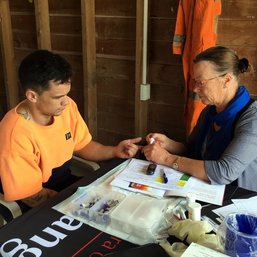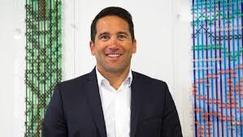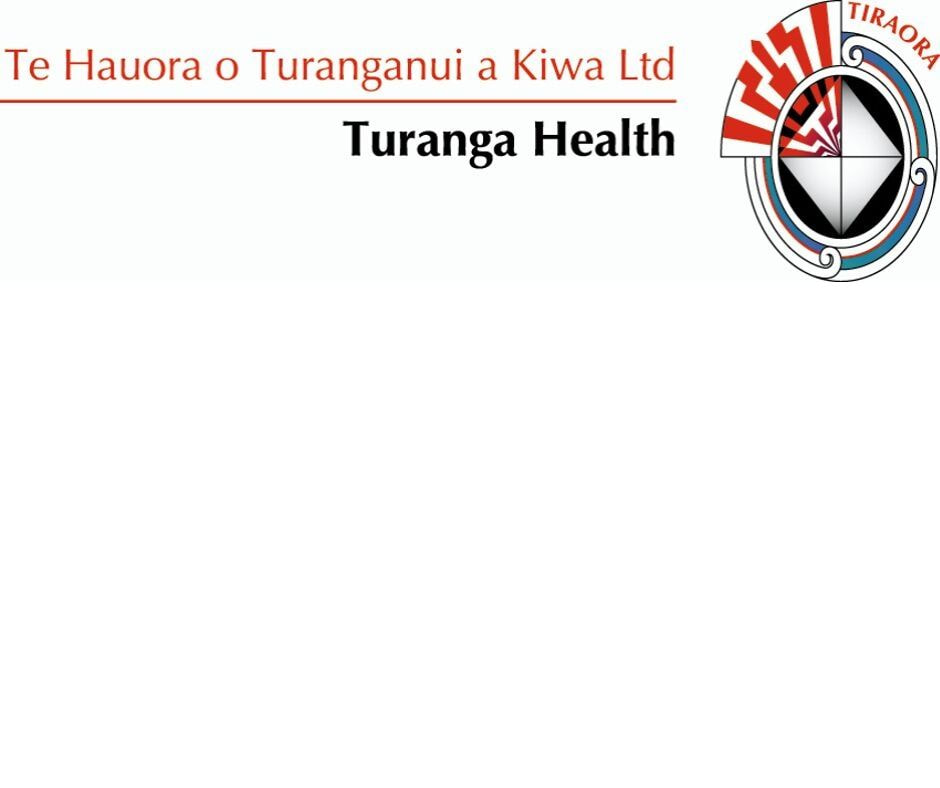 Ernslaw One contractor George Halley has his blood sugar levels tested by Turanga Health nurse Linda Hardgraves. Ernslaw One contractor George Halley has his blood sugar levels tested by Turanga Health nurse Linda Hardgraves. FORTY contractors working with New Zealand’s fourth largest forest owner Ernslaw One, were the first to benefit from Turanga Health’s mobile forestry health checks yesterday [Tuesday 21 February]. The onsite workplace wellness programmes for forestry staff is making it easier for them to seek medical help while also taking better care of themselves, says Turanga Health coordinator Dallas Poi. “The health checks are tailored to meet the needs of men and women working in an industry where it’s not always easy to slip away to see a nurse in the middle of the day.” Ernslaw One Gisborne regional manager Iain McInnes said the health checks carried out at the Mangatu forest headquarters yesterday were well received by those who passed through. “We were really keen to have Turanga Health offer the service to our contracting staff. People are the most valuable asset in any company and so investing in the health of our workforce makes good business sense as well as being the right thing to do.” Mr McInnes says a healthy and happy workforce is just as important as investing in maintaining buildings and equipment. “We’re working with some talented people and we want to make sure they are well. The onsite health check was a unique opportunity for our staff and we’re thrilled it’s going to be available to others working in the forestry industry.” Turanga Health had its state-of-the-art mobile clinic in the Whatatutu hills all Tuesday afternoon. It was staffed by four nurses, a smoking cessation coach, and a kaiāwhina (community health worker). Forestry crew warratah drivers, fallers, break out staff, machinery operators, and digger and truck drivers, all came through the health check clinic. The comprehensive health check was about more than just eating habits and exercise, says Ms Poi. “The initial assessments, which take up to half an hour, looked at a forester’s age, gender, ethnicity, weight, family history, blood pressure, glucose and cholesterol levels, and diabetic and smoking status.” A person’s risk of developing heart problems in the next five years was also assessed. “People can be told they have a risk ranging from mild to very high and where appropriate were directed to their GP or given education.” Medication, alcohol, anxiety and depression were also discussed during the private consultations. Female staff had the chance to talk about women’s health issues such as smears and breast checks. Ms Poi says yesterday when the forestry workers stepped inside Turanga Health’s four-wheel-drive truck and saw it was a fully functional clinic room they were pleasantly surprised. “Turanga Health does whatever it takes” to get health care and support to workers. “Health services offered Monday to Friday, 9am to 5pm, don’t work for most primary industry staff which is why we take the services to the people on the roadside, or into the forest, any time of the day.” Eastland Wood Council chief executive Prue Younger said the health checks are the result of a joint partnership between the wood council and Turanga Health which “aims to build a culture of health in the forestry industry.” Ngati Porou Hauora nurses and support staff will help provide the mobile service when it’s taken to Ernslaw One contractors at Tokomaru Bay in March. Ends For more information contact: Dallas Poi, Turanga Health, (06) 869 0457.
1 Comment
 A revolutionary way to get help from a doctor using iPads in schools was been introduced at five Tairāwhiti kohanga last week by 2014 New Zealander of the Year Dr Lance O’Sullivan. The popular Kaitaia doctor was in Gisborne promoting a recently developed iPad application that can be used by trained adults in schools to assess a child's general health. Known as iMOKO the assessments are sent via the internet to GPs in Kaitaia where they are reviewed and advice on any treatment needed is sent directly to whānau - saving them the cost of a trip to the doctor. Like Uber, the world’s largest taxi firm that owns no cars, and Airbnb, the accommodation provider which owns no property, iMOKO is revolutionary. The technology enables existing infrastructure to be used more efficiently. “We’re just using every day technology to put health care into the hands of the people,” Dr O’Sullivan told local health providers during presentations at Turanga Health on Thursday. “Out of anger I have developed courage to change things and the vehicle is iMOKO.” Dr O’Sullivan’s says his anger was directed at the inability of vulnerable whānau to access health care. As well as geographical isolation, cultural, social and financial isolation was preventing families in the Far North from getting help. “Too many times the current system gets an F-grade. While this new way may meet some resistance from traditional health care providers the reality is, we are targeting unmet need. It’s disruptive innovation. It saves time, it saves money, and it’s enhancing primary care.” As well as being used in schools and early education, Dr O’Sullivan says he’d helped introduce it into a Kaitaia gang pad, and will soon be doing the same in Hastings. Turanga Health Chief Executive Reweti Ropiha applauds the notion of bringing technology to whānau so they have the ability to connect to health care and good decision making. And he’s pleased the iMOKO team is looking at ways to have GPs from around the country, including Tairāwhiti, involved. “It’s not just about bricks and mortar anymore”. iMoko is funded by Māori health innovation fund Te Ao Auahatanga Hauora Māori, and is a Whānau Ora initiative. Dr O’Sullivan was hosted by Midlands Health Network and Hauora Tairawhiti while in Gisborne. |
Media Releases
Email us if you want to receive our media releases. Archives
February 2024
|


